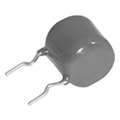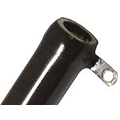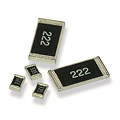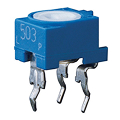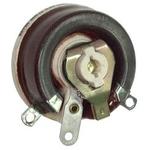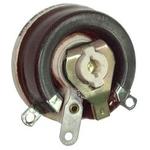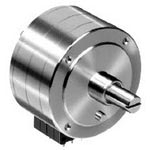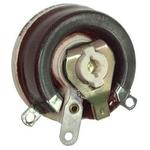Electronic resistors are essential components in nearly every modern electronic circuit, providing safe, precise control of electrical current and protecting sensitive devices from damage. The right resistor choice directly affects performance and reliability, whether you're managing high-volume manufacturing or working on a single prototype. Quality electronic component distributors offer extensive inventories, fast shipping, and authorized supplier sourcing to fill orders quickly with trusted parts.
Our electronic resistor category features a comprehensive range, covering both fixed and variable types plus key specialty products. We stock major industry brands with resistors in countless resistance values, power ratings, and tolerance levels. You'll find surface-mount technology (SMT) chip resistors, through-hole carbon film resistors, high-precision metal film resistors, wirewound resistors for demanding power applications, and more. Filter by resistance (ohms), power rating (watts), tolerance percentage, or temperature coefficient to find exactly what your design needs. This selection works for production engineers, maintenance professionals, electronics designers, and hobbyists.
How to Choose the Right Electronic Resistor
Selecting the best electronic resistor starts with reviewing your circuit's requirements. Determine the correct resistance value in ohms to match your electrical needs. A mismatch can cause circuit instability or component failure. Check the power rating in watts to verify the resistor can safely dissipate heat under normal operating conditions. Consider whether SMT or through-hole mounting fits your process. Applications requiring precise voltage control or low noise benefit from resistors with tighter tolerance and stable temperature coefficients. These specifications affect both product longevity and system performance.
Popular Applications for Electronic Resistors
Electronic resistors power countless applications. Consumer electronics manufacturers use them in mobile phones, tablets, and home entertainment systems. The automotive industry relies on resistors for safety systems, lighting modules, and engine control units. Industrial automation depends on resistors for motor control, sensor protection, and signal conditioning in factory environments. Medical equipment designers choose high-precision resistors for patient monitors and diagnostic devices, where accuracy and safety matter most. Educational labs and makerspaces stock resistors for training kits, circuit experiments, and prototypes. Having the right part available can make the difference between a smooth launch and expensive delays.
Why Buy Electronic Resistors from Online Components
Online Components provides extensive inventories, fast shipping, and authorized supply chains. Major distributors like Online Components give immediate access to hundreds of thousands of resistor part numbers, ready to ship same day in most cases. Every product listing includes detailed technical information and real-time stock status, making selection and ordering straightforward. Our experienced customer service teams handle questions and sourcing needs, creating a smooth purchasing process. For electronics professionals who value speed, reliability, and verified authenticity, established distributors are the smart choice. Purchase your electronic resistors from reputable distributors today and keep your projects moving forward.
Electronic Resistors: What You Need to Know
What are the main types of resistors, and how do they differ?
Resistors are available in several core types, including fixed, variable, wire-wound, thick-film, and thin-film. Fixed resistors maintain a constant resistance, whereas variable types, such as potentiometers or rheostats, allow for adjustable resistance. Wirewound resistors are ideal for high-power applications due to their durability and accuracy. Thin film resistors offer low noise and high precision, whereas thick film resistors are commonly used in less sensitive, cost-conscious designs. The best type depends on performance, stability, and environmental requirements.
How do I choose the correct resistor tolerance for my application?
Tolerance defines the maximum variation in a resistor's resistance from its labeled value. Common tolerances include ±0.1%, ±1%, and ±5%, with lower values indicating higher precision. High-precision circuits, such as analog measurement systems, require tighter tolerances to ensure accuracy. In contrast, digital or power supply applications may function reliably with broader tolerance ranges. Evaluate your circuit's sensitivity to resistance variation before selecting a tolerance level.
What does the power rating of a resistor mean?
The power rating indicates the amount of heat a resistor can safely dissipate, expressed in watts. If a resistor dissipates more power than it is designed to handle, it can overheat, drift in value, or fail. To ensure reliability, choose a resistor with a power rating of at least twice the expected load. In high-current or thermally constrained designs, derating may also be necessary. Always verify environmental conditions to ensure you do not exceed rated performance.
Are there resistors suited for high-power applications?
Yes, high-power resistors rated at 5 watts, 10 watts, or higher handle greater heat and current loads. They're commonly used in power supplies, amplifiers, and industrial equipment.
Can resistors be used in high-frequency applications?
At high frequencies, resistors can exhibit parasitic inductance and capacitance, which affect their performance. Wirewound resistors, for example, are generally unsuitable due to their inherent inductive properties. Thin film resistors are preferred in RF or high-speed digital circuits because of their stability and low parasitic effects. In sensitive signal paths, it's essential to select components specifically designed for high-frequency applications. Always review frequency response data when selecting resistors for such applications.
How do temperature coefficients affect resistor performance?
The temperature coefficient (TC) measures the change in resistance with temperature, expressed in parts per million per degree Celsius (ppm/°C). A low TC (e.g., ±25 ppm/°C) is crucial for applications requiring consistent resistance across varying thermal conditions. Higher TC values can lead to significant resistance drift in environments with fluctuating temperatures. This can affect performance in precision analog, timing, or sensor circuits. Select resistors with appropriate temperature coefficient (TC) ratings based on the operating temperature ranges and stability requirements.
What is the difference between SMT resistors and through-hole resistors?
SMT resistors are compact and designed for automated assembly on printed circuit boards (PCBs), while through-hole resistors have leads for manual or wave soldering. Your assembly process and board design will guide this choice.
Can resistors be used in both alternating current (AC) and direct current (DC) circuits?
Absolutely. Resistors function the same way in AC and DC circuits, reliably controlling current and dividing voltage.
temas bize
 English
English
 Chinese
Chinese
 Italiano
Italiano
 Portuguese
Portuguese
 Deutschland
Deutschland
 French
French
 Russian
Russian
 Japanese
Japanese
 Turkish
Turkish
 Korean
Korean
 Spanish
Spanish
